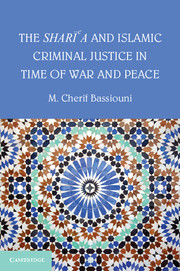Book contents
- Frontmatter
- Contents
- Glossary of Terms
- Table of Abbreviations
- Introduction
- 1 The Sharīca, Islamic Law (Fiqh), and Legal Methods (cIlm Uṣūl al-Fiqh)
- 2 The Postulates of Human Rights and the Place of Justice in Islam
- 3 The Islamic Criminal Justice System
- 4 Islamic International Law and International Humanitarian Law
- 5 The Sharīca, Islamic Law, and Contemporary Post-Conflict and Transitional Justice
- Appendix A Chronology of Significant Dates in the History of Islam
- Appendix B Armed Conflicts Involving Muslim States
- Appendix C Statute of the International Islamic Court of Justice
- Appendix D The Cairo Declaration on Human Rights in Islam
- Appendix E Convention of the Organization of the Islamic Conference on Combating International Terrorism
- Bibliography
- Index
- References
Introduction
Published online by Cambridge University Press: 05 June 2014
- Frontmatter
- Contents
- Glossary of Terms
- Table of Abbreviations
- Introduction
- 1 The Sharīca, Islamic Law (Fiqh), and Legal Methods (cIlm Uṣūl al-Fiqh)
- 2 The Postulates of Human Rights and the Place of Justice in Islam
- 3 The Islamic Criminal Justice System
- 4 Islamic International Law and International Humanitarian Law
- 5 The Sharīca, Islamic Law, and Contemporary Post-Conflict and Transitional Justice
- Appendix A Chronology of Significant Dates in the History of Islam
- Appendix B Armed Conflicts Involving Muslim States
- Appendix C Statute of the International Islamic Court of Justice
- Appendix D The Cairo Declaration on Human Rights in Islam
- Appendix E Convention of the Organization of the Islamic Conference on Combating International Terrorism
- Bibliography
- Index
- References
Summary
Islam remains misunderstood by many in the West because it has not been part of the Western cultural tradition. Negative perceptions are enhanced by Western popular reactions to abhorrent practices committed by some Muslims, even when those practices clearly contradict the teachings of Islam. Western perceptions, however, do not usually take into account the differences between Western and Muslim societies in terms of human, social, and economic development. The latter societies are still struggling with their relatively recent emergence from colonization and the negative influences of Western neo-imperialism that have kept nondemocratic forms of government in place for nearly a century since the dismantling of the Ottoman Empire in 1922 CE.
Contrary to what many in the West believe, Muslims have suffered the most themselves from the wrongful, violent practices and erroneous or misleading religious beliefs held by some Muslims. This is evident in that fact that, since World War II, the number of Muslims killed by Muslims far exceeds the number of Muslims killed by non-Muslims. Consider, for instance, that since 2003 in Iraq it is estimated that more than 300,000 Muslims and as many as 20,000 Christians have been killed by Muslims in a sectarian struggle that cannot find any justification under the respective sects’ best interpretations. Prior to that, during Saddam Hussein's rule, another 300,000 Muslims were killed by Muslims, and in the Iran-Iraq war of the 1980s, an estimated 1 million Muslims from these two countries were killed, including from the use of chemical weapons. The same is true in Afghanistan, where an estimated 400,000 Afghan and Pakistani Muslims have been killed by other Afghan and Pakistani Muslims since the Russians withdrew in 1989. Even though the Taliban and others today claim to fight against a foreign occupier, the number of Afghan Muslims killed by the Taliban is far greater than the total number killed by Western foreign occupiers. Similarly, when Bangladesh declared its independence from Pakistan in 1971, nearly 1 million Bengali Muslims were killed by pro-Pakistan Muslim forces. What is presently happening in Syria is the most recent glaring example of Muslims’ violations of the sharīca and Islamic law (fiqh), as well as secular international humanitarian law (IHL) and international human rights law (IHRL).
- Type
- Chapter
- Information
- Publisher: Cambridge University PressPrint publication year: 2013



